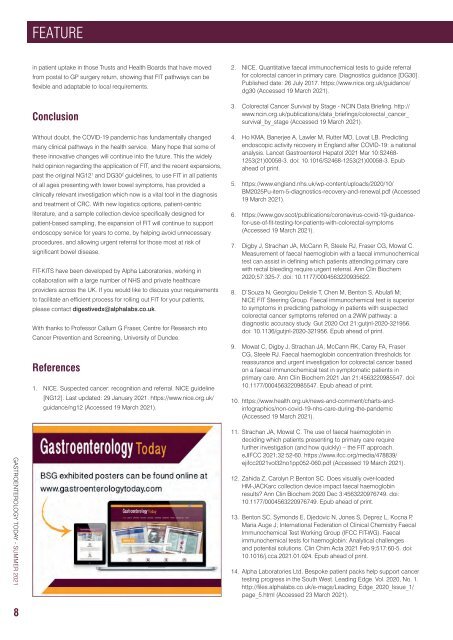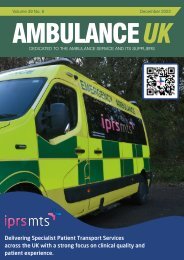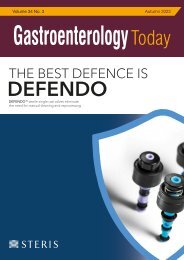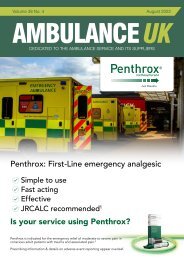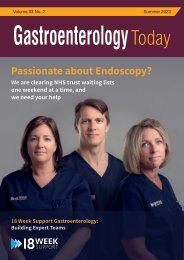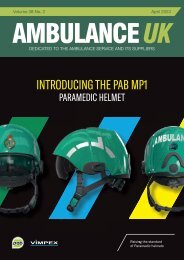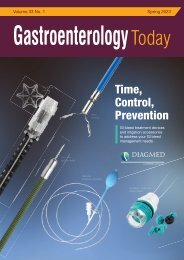Gastroenterology Today Summer 2021
Gastroenterology Today Summer 2021
Gastroenterology Today Summer 2021
Create successful ePaper yourself
Turn your PDF publications into a flip-book with our unique Google optimized e-Paper software.
FEATURE<br />
in patient uptake in those Trusts and Health Boards that have moved<br />
from postal to GP surgery return, showing that FIT pathways can be<br />
flexible and adaptable to local requirements.<br />
Conclusion<br />
Without doubt, the COVID-19 pandemic has fundamentally changed<br />
many clinical pathways in the health service. Many hope that some of<br />
these innovative changes will continue into the future. This the widely<br />
held opinion regarding the application of FIT, and the recent expansions,<br />
past the original NG12 1 and DG30 2 guidelines, to use FIT in all patients<br />
of all ages presenting with lower bowel symptoms, has provided a<br />
clinically relevant investigation which now is a vital tool in the diagnosis<br />
and treatment of CRC. With new logistics options, patient-centric<br />
literature, and a sample collection device specifically designed for<br />
patient-based sampling, the expansion of FIT will continue to support<br />
endoscopy service for years to come, by helping avoid unnecessary<br />
procedures, and allowing urgent referral for those most at risk of<br />
significant bowel disease.<br />
FIT-KITS have been developed by Alpha Laboratories, working in<br />
collaboration with a large number of NHS and private healthcare<br />
providers across the UK. If you would like to discuss your requirements<br />
to facilitate an efficient process for rolling out FIT for your patients,<br />
please contact digestivedx@alphalabs.co.uk.<br />
With thanks to Professor Callum G Fraser, Centre for Research into<br />
Cancer Prevention and Screening, University of Dundee.<br />
References<br />
1. NICE. Suspected cancer: recognition and referral. NICE guideline<br />
[NG12]. Last updated: 29 January <strong>2021</strong>. https://www.nice.org.uk/<br />
guidance/ng12 (Accessed 19 March <strong>2021</strong>).<br />
2. NICE. Quantitative faecal immunochemical tests to guide referral<br />
for colorectal cancer in primary care. Diagnostics guidance [DG30].<br />
Published date: 26 July 2017. https://www.nice.org.uk/guidance/<br />
dg30 (Accessed 19 March <strong>2021</strong>).<br />
3. Colorectal Cancer Survival by Stage - NCIN Data Briefing. http://<br />
www.ncin.org.uk/publications/data_briefings/colorectal_cancer_<br />
survival_by_stage (Accessed 19 March <strong>2021</strong>).<br />
4. Ho KMA, Banerjee A, Lawler M, Rutter MD, Lovat LB. Predicting<br />
endoscopic activity recovery in England after COVID-19: a national<br />
analysis. Lancet Gastroenterol Hepatol <strong>2021</strong> Mar 10:S2468-<br />
1253(21)00058-3. doi: 10.1016/S2468-1253(21)00058-3. Epub<br />
ahead of print.<br />
5. https://www.england.nhs.uk/wp-content/uploads/2020/10/<br />
BM2025Pu-item-5-diagnostics-recovery-and-renewal.pdf (Accessed<br />
19 March <strong>2021</strong>).<br />
6. https://www.gov.scot/publications/coronavirus-covid-19-guidancefor-use-of-fit-testing-for-patients-with-colorectal-symptoms<br />
(Accessed 19 March <strong>2021</strong>).<br />
7. Digby J, Strachan JA, McCann R, Steele RJ, Fraser CG, Mowat C.<br />
Measurement of faecal haemoglobin with a faecal immunochemical<br />
test can assist in defining which patients attending primary care<br />
with rectal bleeding require urgent referral. Ann Clin Biochem<br />
2020;57:325-7. doi: 10.1177/0004563220935622.<br />
8. D’Souza N, Georgiou Delisle T, Chen M, Benton S, Abulafi M;<br />
NICE FIT Steering Group. Faecal immunochemical test is superior<br />
to symptoms in predicting pathology in patients with suspected<br />
colorectal cancer symptoms referred on a 2WW pathway: a<br />
diagnostic accuracy study. Gut 2020 Oct 21:gutjnl-2020-321956.<br />
doi: 10.1136/gutjnl-2020-321956. Epub ahead of print.<br />
9. Mowat C, Digby J, Strachan JA, McCann RK, Carey FA, Fraser<br />
CG, Steele RJ. Faecal haemoglobin concentration thresholds for<br />
reassurance and urgent investigation for colorectal cancer based<br />
on a faecal immunochemical test in symptomatic patients in<br />
primary care. Ann Clin Biochem <strong>2021</strong> Jan 21:4563220985547. doi:<br />
10.1177/0004563220985547. Epub ahead of print.<br />
10. https://www.health.org.uk/news-and-comment/charts-andinfographics/non-covid-19-nhs-care-during-the-pandemic<br />
(Accessed 19 March <strong>2021</strong>).<br />
GASTROENTEROLOGY TODAY - SUMMER <strong>2021</strong><br />
11. Strachan JA, Mowat C. The use of faecal haemoglobin in<br />
deciding which patients presenting to primary care require<br />
further investigation (and how quickly) – the FIT approach.<br />
eJIFCC <strong>2021</strong>;32:52-60. https://www.ifcc.org/media/478839/<br />
ejifcc<strong>2021</strong>vol32no1pp052-060.pdf (Accessed 19 March <strong>2021</strong>).<br />
12. Zahida Z, Carolyn P, Benton SC. Does visually over-loaded<br />
HM-JACKarc collection device impact faecal haemoglobin<br />
results? Ann Clin Biochem 2020 Dec 3:4563220976749. doi:<br />
10.1177/0004563220976749. Epub ahead of print.<br />
13. Benton SC, Symonds E, Djedovic N, Jones S, Deprez L, Kocna P,<br />
Maria Auge J; International Federation of Clinical Chemistry Faecal<br />
Immunochemical Test Working Group (IFCC FIT-WG). Faecal<br />
immunochemical tests for haemoglobin: Analytical challenges<br />
and potential solutions. Clin Chim Acta <strong>2021</strong> Feb 9;517:60-5. doi:<br />
10.1016/j.cca.<strong>2021</strong>.01.024. Epub ahead of print.<br />
14. Alpha Laboratories Ltd. Bespoke patient packs help support cancer<br />
testing progress in the South West. Leading Edge. Vol. 2020, No. 1.<br />
http://files.alphalabs.co.uk/e-mags/Leading_Edge_2020_Issue_1/<br />
page_5.html (Accessed 23 March <strong>2021</strong>).<br />
8


